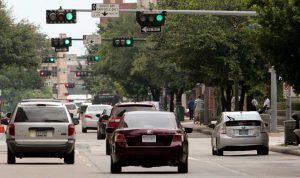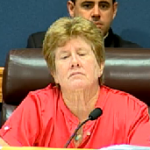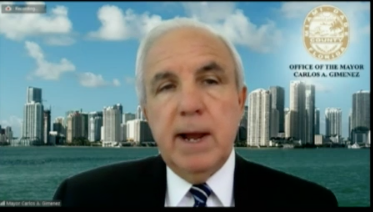County commissioners really want Miami-Dade Mayor Carlos Gimenez to put the contract for the synchronization of traffic lights — yeah, we all thought that had been done already — out for a new bid after a locally prominent serial campaign donor filed  a bid protest and said his company did not get the same advantage as the chosen firm.
a bid protest and said his company did not get the same advantage as the chosen firm.
But Gimenez really wants to hang on to the chosen firm’s bid and will ask the commission to approve the contract at Tuesday’s meeting — even though some commissioners directed him at a committee meeting earlier this month to reject all past proposals, expedite a new process and come back in 45 days with a clean slate of bids.
It’s a tug of war over $86 million. And it’s taking place during a virtual meeting with spotty opportunities for public comment.
That $86 million is the difference between the first ranked bidder, Siemens Mobility, bid at $152 million to synchronize just under 3,000 traffic lights (just under the $156 million the county estimated it would cost), and the second place bidder, Horsepower Electric, bid at $238 million. Each company has had an army of lobbyists routing for them. Last year’s battle of the Miguels — former State Sen. Miguel de la Portilla, on behalf of Siemens, and former State Rep. Miguel DeGrandy, for Horsepower — was fun to watch.
Commissioners who want to rebid say that (1) the savings are too good to be true and (2) the process was flawed by a technical change for turnaround time that came — and was rescinded — after negotiations with the first-ranked company started.
“Usually between one and two it’s tighter, between awardee and not in the ball park best and final offer.” Commissioner Sally  Heyman said at the Chairwoman’s Policy Council meeting May 7, where they asked the administration to start from scratch. Still, Heyman and Commissioner Dennis Moss seemed ready to accept the Siemens proposal, which was also cleared of any bid process violation.
Heyman said at the Chairwoman’s Policy Council meeting May 7, where they asked the administration to start from scratch. Still, Heyman and Commissioner Dennis Moss seemed ready to accept the Siemens proposal, which was also cleared of any bid process violation.
“I really would like to see something done before half my colleagues are off the commission and I have to sit through it as people have to figure out what the hell a traffic management procurement is to begin with for another three years,” Heyman said, referring to the term limits that will boot five commissioners off the dais this year.
Moss wants to leave a legacy. “I want and I want my colleagues also to be able to leave the footprints in the sand,” he said, adding that now would be a good time to take advantage of infrastructure funds coming from the federal government.
But Commission Chairwoman Audrey Edmonson and commissioners Rebeca Sosa and Joe Martinez really want to let Horsepower Electric to get another chance to bid. They forced the vote to start from scratch after Moss said he could count.
Gimenez was not happy about it. He said Horsepower “did a great job of muddying it” because there was no special favors doled out to any bidder. And, actually, the Inspector General’s report said the procurement process was transparent, fair and equitable. “Most people bid around what they thought was budgeted and that’s what they did,” he added.
Siemens happens to be a very reputable company, over 172 years old, so they’e been in business for some time and have over $2 billion market,” he said, adding that the German company has employees in Miami-Dade and will employ Miami-Dade residents. Metric, a Kendall company with 80 employees, will be one of Siemens subcontractors, for example. So is AJC Electric, based in Hialeah, with 77 employees.
Gimenez said there was never a change in the request for bids and that the shorter time frame that Siemens got for approvals  (under the 21 days specified in the RFP) — which he added was approved by the county attorney’s office — was rescinded after the bid complaint. can we and
(under the 21 days specified in the RFP) — which he added was approved by the county attorney’s office — was rescinded after the bid complaint. can we and
A hearing officer did find that there was “some type of material change that changed the entire scope of the entire program and therefore that was not proper,” Gimenez said. “And by the way, I agree with them. We said, no we are going to go back to 21 days, which is what we recommended to you.
“So everything about the contract is the same as it was outlined in the RFP. Nothing has changed except that this is $86 million cheaper,” Gimenez said. “Here is another thing. this money comes from road impact fees, which means that if we pay $86 million more theres $86 million less of road work that we’re going to be doing in Miami Dade County in all of our districts… It is $86 million of our taxpayer dollars. It’s $86 million that we can put out on the road.”
He also reminded the commissioners at the chairwoman’s policy committee that Siemens is a technology leader around the world. What Miami-Dade is buying is an “advanced traffic management system” — not just an installation job, as some of the program will be wireless.
Gimenez told commissioners on May 7 that he would seek new proposals from all the bidders. “Hopefully, Siemens will keep to the same price. I want to see what the other companies come in with because that’s going to be very interesting,” Gimenez said, which means he expects the artificially inflated Horsepower price to come down.
Truth be told, the $86 million is quite a gap between the first place bidder and No. 2.
But what it looks like is that Horsepower saw what they thought was budgeted for the job and submitted a bid for the whole pie.  Ladra hates to agree with Gimenez but even a broken clock is right twice a day. Owner Hector Ortiz, a serial campaign donor who has had several contracts with the county — including the installation of red light cameras — knows how this works. Plus his firm is represented, in part, by Roly Marante, who used to be Commissioner Sosa’s chief of staff.
Ladra hates to agree with Gimenez but even a broken clock is right twice a day. Owner Hector Ortiz, a serial campaign donor who has had several contracts with the county — including the installation of red light cameras — knows how this works. Plus his firm is represented, in part, by Roly Marante, who used to be Commissioner Sosa’s chief of staff.
And Sosa — who is normally a Gimenez pocket vote — is very serious about having this go out to rebid, more serious than we’ve seen her in a long time. The May 7 meeting was the second one in which she insisted the county go back out to bid. “The only thing I will support in this mess is a fair and open competitive process,” she said, pushing hard for the rebidding. “I don’t care who wins. But the person who wins has to win without problems.”
This, even though Horsepower has a bad history of problems with the county. The firm was disbarred from doing business with the county for 18 months after it was prosecuted for bribing the chief construction officer at Miami International Airport (he got a 20+ year sentence). Ladra can’t help but wonder who they are bribing now. Maybe that’s why their bid came in so much higher — gotta have some throw around money. They were also blamed for negligence when faulty wiring at a bus shelter they were supposed to maintain electrocuted two 15-year-old boys to death in 1998.
They got a no-bid pilot program for the synchronization and charged $30,000 per intersection for the first 300 intersections. Their bid for the 2,900 traffic lights under consideration more than doubled that price tag at $75K per intersection.
Siemens, whose reps say it saves money by manufacturing some of their own supplies, using their own employees rather than subcontractors and doing everything on a larger scale, were able to provide a lower figure, a price that is almost exactly in line with the county’s estimate. They are also willing to say that there will be no change orders without commission approval — which is really like saying nothing because commissioners change orders like they change their clothes.
Commissioners who want to rebid also site Siemens’ $1.6 billion in fines in 2008, for one of the biggest bribery cases ever, for a contract in Greece. But the Siemens employees who broke the law in 2008 — and none of them were U.S. employees — have been fired and the company implemented strong ethics and compliance regulations immediately afterwards. Even the U.S. Department of Justice appreciated their cooperation in the case. Horsepower, meanwhile, is still owned by the same corrupt people that were investigated for bribery, disbarred from doing business in Miami-Dade and responsible for the death of two teenage boys.
“Probably the most displeasing thing about being a commissioner is we have to deal with these issues,” Commissioner Esteban Bovo said, referring to several bidding protests that have come to them since the SaveWrap airport baggage wrap contract. “We’ve heard threats of lawsuits. But I’m still perplexed when we end up with such a big difference in price… there’s always a hole in procurement.”
Read related: Miami-Dade’s problematic procurement helps county lobbyists
When asked why he was fighting so hard for a company with such a sketchy past, Commissioner Martinez texted Ladra, assuming she meant Siemens (she did not). “Siemens? $800 million [in] fines for corruption,” Martinez asked, referring to the fines that Siemens ended up paying to U.S. authorities. “That company?”
No, Ladra told him The other company. The one that bribed a county airport worker, who is now in jail, and whose apparent negligence on electrical wiring at county bus shelters led to the death of two teenage boys in 1998. That company.
“So they both suck,” Martinez asked.
Maybe, Ladra answered. The county does business with all kinds of sucky firms. Odebrecht has also been accused of bribery in  Latin America and doing business with the Cuban regime. And MCM, the construction firm owned by the Gimenez-related Munilla brothers, built a pedestrian bridge that collapsed and killed six people. It’s like we’re not very picky.
Latin America and doing business with the Cuban regime. And MCM, the construction firm owned by the Gimenez-related Munilla brothers, built a pedestrian bridge that collapsed and killed six people. It’s like we’re not very picky.
But in this case of two not-so-great firms, one company came in $86 million higher. Why go out again and give them another bite of the apple, Ladra asked the commissioner.
“That’s why [we] let them all go back and put their bid forth on a level playing field,” Martinez wrote in a text. “What’s the harm? We can’t do anything for now anyway. Maybe the third company wins.
“Doesn’t a bid that’s $86 million lower than all the others pique your curiosity?”
Yes. Yes, it does. But, then again, so does a bid that comes in at exactly what the county has budgeted.
And so does this timing. The COVID19 emergency has forced county commission and other government meetings online and, while they have allegedly tried to include public participation, it hasn’t always worked out. Technical problems, it seems. But it also seems very convenient.

